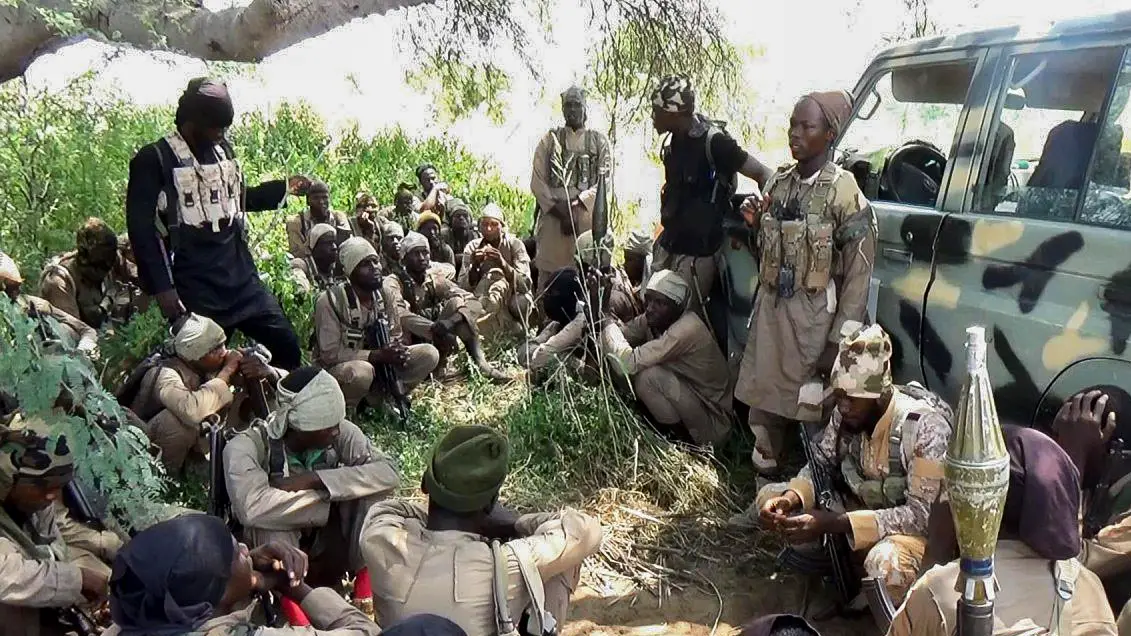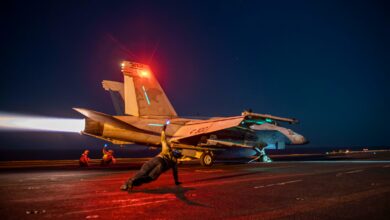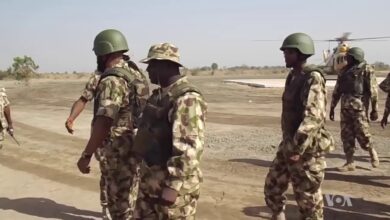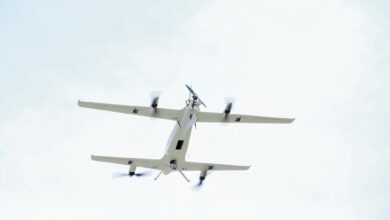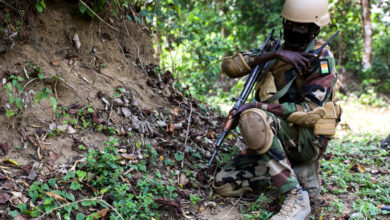Islamic State’s leader Abu Bakr al-Baghdadi has apparently imposed a change in the leadership of its West Africa province affiliate, audio recordings have revealed.
ISIS has not yet made a public statement confirming the change of leader, but two recordings indicate the announcement is being disseminated to the network of ISWA fighters based mainly in Nigeria.
Nigerian journalist Ahmad Salkida, who first broke the story on March 4, reported that according to an 18-minute audio recording, ISIS had replaced Abu Mus’ab al-Barnawi with Abu Abdullah Ibn Umar al-Barnawi.
On March 11, Rice University Ph.D. candidate and editor of the “The Boko Haram Reader” Abdulbasit Kassim in a series of tweets published a translation from the local Hausa language of a 6-minute audio recording that confirmed Salkida’s reporting.
Citing “reliable sources,” the regional Multinational Joint Task Force on March 12 said an “internal crisis” led to the leadership change. “Islamic State West Africa Province announced the sack of the former Boko Haram Chief, Abu Mus’ab Al Barnawi and the appointment of Abu Abdullahi Ibn Umar Al Barnawi,” Colonel Timothy Antigha said.
‘The commander of the believers has deposed Abu Mus’ab al-Barnawi’
Kassim told The Defense Post the undated recording he translated was uploaded to private ISWA communications channels on March 6.
“That channel is the secured channel through which ISWAP share its contents with IS and its members,” Kassim said. “The ISWAP channel is for internal communication and it is different from the plethora of public propaganda channels.”
Salkida explained that the 18-minute audio recording in his possession was the same message that was translated by Kassim but in “three local languages for the members of the group.”
Kassim’s translation of the audio makes it clear that the change in leader was imposed by ISIS central. An unidentified speaker who says he is a member of ISWA’s Shura – or consultative – Council says:
“I am announcing to my mujahideen brothers, commanders, and leaders in the Islamic State West African Province that the commander of the believers has deposed Abū Musʿab al-Barnāwī as the Governor.
“He has been replaced by Shaykh Mujahid Abū Abdīllah Idris bin ʿUmar also known as Ibn ʿUmar al-Barnāwī.
“Together with my brothers in the consultative council, we are announcing to you our hearing and obedience of the command from the Commander of the believers and we are giving our full allegiance to the newly chosen Governor imposed on us by the Commander of the believers.
“And we are saying to him, you should lead us on the commands of Allah. We are the people that listen and obey. There is no one that will disobey you among us. Even if anyone disobeys you, we will all converge with you against him as long as you did not command us to disobey Allah.
“Allah can bear witness for our testimony. At this juncture, I am announcing to my brothers in the entire province that they should follow the footsteps of their leaders in the consultative council and give their hearing and obedience to the new Governor. We are praying to God to help and guide him. In the end, I am reminding all my brothers that the deposition and replacement of a Governor in the caliphate is not a new phenomenon that started today.”
The speaker then gives an example of the second caliph, ʿUmar ibn al-Khaṭtāb, who in the seventh century “deposed and replaced great companions of the prophet such as Saʿd ibn Abī Waqqās and Khālid ibn al-Walīd.”
“Today, we are also saying that we hear and we obey the Commander of the believers,” the speaker concludes.
Salkida has said that Abu Musab al-Barnawi himself made the announcement.
ISWA leadership changes
Beyond the kunya “al-Barnawi” indicating he is from Nigeria’s Borno state, very little is known about Umar Al-Barnawi.
His appointment is not the first time ISIS central has replaced an ISWA leader.
After the death of founder Mohammed Yusuf, new leader Abubakar Shekau began Boko Haram’s campaign of extreme violence in earnest, declaring a caliphate in 2014.
Shekau and other senior figures pledged bayat (allegiance) to ISIS leader Abu Bakr al-Baghdadi in March 2015 and Boko Haram became Islamic State’s West Africa wilayat, or province.
But Shekau’s dictatorial leadership style, ruthless brutality, his definition of what constituted apostasy and use of takfir (excommunication) caused rifts within the group. In August 2016 he was replaced as leader, with ISIS appointing Abu Musab al-Barnawi, Yusuf’s son, as wali, or governor, of the province.
Shekau rejected Barnawi’s appointment, and Boko Haram split into two factions, with Shekau leading one faction and Barnawi the other, but ISIS central only gives formal backing to the Barnawi faction.
Kassim told The Defense Post that he had confirmed via other internal communications within the group that new leader Abu Abdulla Idris is also known as Ba Idrissa, who was first mentioned in August 2016 when Mamman Nur verbally attacked then-leader Abubakar Shekau.
Nur, a high-ranking figure within Boko Haram – and later ISWA – who was close to Barnawi, was killed in August 2018 “because he violated the principles of the group on issues of negotiation and other issues involving his back-channel deals which were deemed inappropriate,” Kassim said.
Nur’s assassination was followed by another. ISWA commander Ali Gaga was killed by his comrades over an alleged plan to turn over hundreds of hostages to the Nigerian military, and, as Georgetown University adjunct professor of Violent Non-State Actors in World Politics Jacob Zenn notes, Nur is believed to have been removed for similar reasons, including potential “peace talks” with the government. ISIS central is believed to have ordered Nur’s killing.
“The circumstances surrounding Nur’s death suggest that the new leader will not follow the placatory approach,” Kassim tweeted.
Omar Mahmood, Senior Researcher at the Institute for Security Studies in Addis Ababa, told The Defense Post that Abu Musab al-Barnawi’s removal had a certain inevitability after Nur’s killing.
“They were seen as very much of the same cloth, so the removal of Nur in some ways made it a matter of time before something happened to Abu Musab al-Barnawi,” Mahmood said, adding that he believes Nur was “very much the power behind the group during the time of the split.”
He also said that the lack of confirmation of the leadership change from ISIS central follows the same pattern as the 2016 change.
“When Nur/Barnawi broke off from Shekau, it really took a few months before IS central announced that publicly,” he said. “It is interesting in this case that the announcement has already been made locally, so it does indeed put pressure on IS central to comment soon, lest it looks like they have little control over their affiliates (which may indeed be the case),” he added.
Kassim highlighted the different conditions for ISIS globally in 2016 versus 2019.
“The status of IS central at the time al-Barnawi was selected and Shekau deposed is completely different from their current status,” Kassim told The Defense Post. “The caliphate has collapsed in Iraq and Syria and the few surviving leaders are on the run.”
“Also, the circumstances that led to al-Barnawi’s deposition is different from Shekau’s deposition,” Kassim said, noting that Shekau was replaced for ideological reasons while Barnawi was not.
But he also noted that during the initial schism that led to Shekau’s deposition, Abu Abdullah Idrissa “queried Shekau’s flawed interpretation of Quranic exegesis.”
Abu Musab al-Barnawi’s fate?
Kassim told The Defense Post that Abu Mus’ab al-Barnawi is unlikely to suffer the same fate as Nur.
“Nothing will happen to Abu Mus’ab,” he said. “He will accept the deposition and continue to serve in the Shura Council of the group. He will not protest like the way Shekau protested in 2016.”
Mahmood was more cautious.
“He likely would’ve seen such a move coming, especially after Nur’s elimination, so I imagine he has some sort of a contingency plan,” he told The Defense Post.
“If there is any sort of strong resistance on his part, I imagine he wouldn’t survive too long, unless he can find some significant backing,” he said. “It is unclear if he has enough support around him to form his own faction.”
Salkida has said that there there are indications of a split within ISWA, something that Kassim earlier noted as a possibility, with some members opposed to increasing criminality reasserting the ideological basis for their jihad.
For now, it appears that Abu Musab al-Barnawi is safe. “Multiple sources insist that Abu Musab is alive and well, and still with #ISWAP despite his abrupt demotion by IS central,” Salkida tweeted on March 4, and on March 15, AFP reported an unnamed source as saying he is “in the custody of the new leadership.”
Whither ISWA?
The question “What’s next for ISWA under its new leader?” is one that remains to be answered.
One long-speculated on possibility is a re-unification of the two Boko Haram factions.
“It is unlikely that Abu Abdullah Idrissa will merge with Shekau,” Kassim tweeted earlier in a thread analyzing the leadership change. “Although both ISWAP and JAS [Shekau’s Boko Haram faction] have shown that they can temporarily halt their hostility and fight against their ‘Greater Enemy,’ they are yet to resolve their ideological differences.”
Kassim said that while attempting to portray an “ideological purity,” ISWA has “gradually been morphing into the Sahelian-type criminal jihadist gang,” arguing that the group lacks a committee of Islamic scholars to train recruits, leading to “a generation of ISWAP fighters who are more committed to combat and who rely on ISIS WhatsApp groups for their daily theological training.”
“I think a merger is still out of the question,” Mahmood told The Defense Post. “There are ideological divides with Shekau that remain unbridged, especially with regards to the determination of who is and is not a civilian.”
“Recent attacks bear this out – Shekau’s faction devastated Rann and pursued fleeing civilians, while around the same time the Barnawi group attacked Baga, but let people leave freely if they wanted to,” Mahmood said.
“Based on the past, there is also just little trust when it comes to Shekau,” he added.
And does the leadership change point to a potentially more violent ISWA, one that shows less compunction about attacking civilian targets?
“ISWAP has always been cautious with its strategy and battlefield tactics against the civilian population,” Kassim said. “The group pays attention to winning the hearts and minds of the local population who are the citizens in the areas controlled by the group.”
“What we might see with this change of leadership is a firmer grip on the modus operandi of the group from a leader who is considered as a veteran with a less tender approach than the perceived weakness in Abu Mus’ab al-Barnawi,” he added.
Mahmood noted a change in tactics coinciding with Nur’s killing.
“So what has happened since then – a blitzkrieg of assaults on military bases northern Borno, a continued expansion of operations in parts of Yobe and south-central Borno (including around Maiduguri for the first time during the electoral period), and episodic instances of territorial control (at least until security reinforcements arrive), would likely continue,” he said.
But reorienting violence towards the security forces and improving relations with civilians is paying off for ISWA, allowing the group to levy taxes instead of undertaking raids for supplies.
“That strategy has worked, so I see no reason why they would give that up now,” Mahmood said. “ISWA is stronger than Shekau right now, which was not guaranteed to be the case when they split in 2016.”
This post was updated to correct attribution for a quote. The Defense Post regrets the error.

